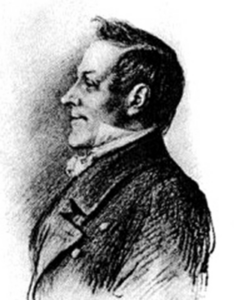Orestes, having made atonement
(Poet's title: Der entsühnte Orest)
Set by Schubert:
D 699
[September 1820]
Zu meinen Füßen brichst du dich,
O heimatliches Meer,
Und murmelst sanft. Triumph! Triumph!
Ich schwinge Schwert und Speer.
Mycene ehrt als König mich,
Beut meinem Wirken Raum,
Und über meinem Scheitel saust
Des Lebens goldner Baum.
Mit morgendlichen Rosen schmückt
Der Frühling meine Bahn,
Und auf der Liebe Wellen schwebt
Dahin mein leichte Kahn.
Diana naht; o Retterin,
Erhöre du mein Flehn!
Lass mich, das Höchste wurde mir,
Zu meinen Vätern gehn.
You are breaking at my feet,
Oh sea of my homeland!
And you are gently murmuring: ‘Triumph! Triumph!’
I am carrying my sword and spear.
Mycenae honours me as king,
Allows me scope for action,
And rustling above my head is
The golden tree of life.
Fresh roses are adorning
My path, provided by the spring,
And floating on the waves of love
My light boat glides along.
Diana is approaching! Oh, saviour,
Respond to my prayers!
Allow me, if I may reach the highest point,
To go now to my ancestors!
All translations into English that appear on this website, unless otherwise stated, are by Malcolm Wren. You are free to use them on condition that you acknowledge Malcolm Wren as the translator and schubertsong.uk as the source. Unless otherwise stated, the comments and essays that appear after the texts and translations are by Malcolm Wren and are © Copyright.
☙
Themes and images in this text:
The ancient world Artemis / Diana Boats Father and child Feet Gold Home (Heimat) Paths Roses and pink The sea Spring (season) Swords and daggers Trees (general) Vengeance Waves – Welle
The last time that Orestes landed on his native shore he faced the prospect of avenging the murder of his father, Agamemnon, which would involve slaying his own mother (Klytemnestra) as well as her lover (Aegisthus). Writers in ancient Greece told a number of different stories about what happened to him after he had committed the matricide, but Mayrhofer’s text seems to be based on Euripides (followed by Goethe and Gluck), who wrote about his visit to Tauris and his encounter there with his sister Iphigenia (cf. Mayrhofer’s text and Schubert’s setting of it, D 548 Orest). Their reunion, and their decision to return the image of Artemis (= Diana) to Greece, allowed Orestes to experience some sort of expiation or atonement. Thus, as Mayrhofer’s poem begins, Orestes feels free of the pursuing Furies (his ‘inner demons’ as we might now call them).
Orestes now claims his kingdom, but the sea of his homeland only murmurs its acclamation in subdued tones. This is no grand, triumphal entry. Orestes experiences his return as something calm and verdant, like the gradual arrival of spring. There are fresh (literally ‘morning’) roses strewn over his path and the golden tree of life rustles gently over his head. The boat that has brought him to this shore is gliding lightly on the waves of love. Yet, despite all of this language of spring and new life, Orestes is now ready to die, to join his ancestors. Mayrhofer ignores all of the versions of the myth in which Orestes settles in Mycenae and marries Hermione. It is enough that Orestes simply returns home, or rather, that he recognises that his true home is not the land of the living but the realm of the dead. It is only when he sets foot on that other shore that he will be truly rescued and atoned.
☙
Original Spelling and Note on the Text Der entsühnte Orest Zu meinen Füßen brichst du dich O heimatliches Meer! Und murmelst sanft: Triumph! Triumph! Ich schwinge Schwert und Speer. M y c e n e ehrt als König mich, Beut meinem Wirken Raum, Und über meinem Scheitel saus't Des Lebens goldner Baum. Mit morgendlichen Rosen schmückt Der Frühling meine Bahn, Und auf der Liebe Wellen schwebt Dahin mein leichte Kahn. D i a n a naht! o Retterin, Erhöre du mein Fleh'n! Laß mich - das Höchste wurde mir - Zu meinen Vätern geh'n! There are a number of differences between the text as published by Mayrhofer in 1824 and the setting made by Schubert in 1820 (marked in bold below). It is impossible to know if Schubert made the changes himself or if he was working from an earlier draft of the poem. Der entsühnte Orest Zu meinen Füßen wiegst du dich O heimatliches Meer! Ich rufe dir: Triumph! Triumph! Und schwinge Schild und Speer. M y c e n e ehrt als König mich, Beut meinem Wirken Raum, Und über meinen Scheitel saus't Des Lebens reicher Baum. Mit morgendlichen Rosen schmückt Der Frühling meine Bahn, Und auf der Liebe Wellen schwebt Dahin der leichte Kahn. D i a n a naht! o Retterin, Erhöre du mein Fleh'n! Laß mich - das Höchste ward mir ja - Nun zu den Vätern geh'n!
Confirmed by Peter Rastl with Gedichte von Johann Mayrhofer. Neue Sammlung. Aus dessen Nachlasse mit Biographie und Vorwort herausgegeben von Ernst Freih. v. Feuchtersleben. Wien, 1843. Verlag von Ignaz Klang, Buchhändler, page 288.
To see an early edition of the text, go to page 288 [308 von 320] here: http://digital.onb.ac.at/OnbViewer/viewer.faces?doc=ABO_%2BZ17745080X


